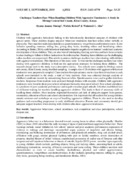| dc.contributor.author | Murugi, Joanna Oyamo | |
| dc.contributor.author | Wafula, Robert | |
| dc.contributor.author | Walumoli, L. Alex | |
| dc.date.accessioned | 2019-06-19T14:02:46Z | |
| dc.date.available | 2019-06-19T14:02:46Z | |
| dc.date.issued | 2018-09-03 | |
| dc.identifier.issn | 2415-0770 | |
| dc.identifier.uri | http://erepository.kibu.ac.ke/handle/123456789/1191 | |
| dc.description.abstract | Children with aggressive behaviours belong to the behaviourally disordered category of children with
special needs. These children display negative behaviour tendencies that hurt others either verbally or
physically. They manifest such characteristics as quarrelsomeness, vengefulness and destructiveness. It also
includes spreading rumours, telling lies, giving dirty looks, insulting others and humiliating others.
According to Botha (2014), such behaviour tendencies impedes negatively on learners’ social and academic
development of these children. They are also font of interrupting learning activities and lack focus on tasks
in class leading to failure to follow instructions from the teacher. Handing these children can be challenging
unless teachers are empowered. This article examines challenges teachers face when dealing with children
with aggressive tendencies. The objectives of the study were: to find out the challenges teachers face when
dealing with aggressive children; to find out the appropriate strategies for helping these children. The
research design used in the study was a descriptive survey. Ten schools were sample in Mwingi central
sub county, Kitui County, using stratified sampling. A sample size of 20 children with aggressive behaviour
tendencies were purposively sampled. Class teachers from pri-primary one to class three (4 teachers in each
school) were included in the study, a total of forty teachers. Data was collected through analysis of
children’s academic records by summarising them on tables. Questionnaires were used to gather data from
teachers. Responses from teachers were analysed through themes with excerpts. Children with aggressive
tendencies were found to show poor school attendance but rarely drop out of school. Poor school attendance
is a predictor of poor academic performance and negative teacher-pupil attitude. It further established lack
of sufficient training for teachers handling aggressive children. This leads to lack of necessary skills of
handling these children. Most teachers expressed frustration and lack of adequate support from parents,
community, education officers and school administration. It is important that all teachers for young children
attends seminars and workshops on ways of handling aggressive children. There is also need to develop
guidance and counselling programme in early childhood education. Parents and community should give
adequate support teachers when dealing with children who show aggressive tendencies. | en_US |
| dc.language.iso | en | en_US |
| dc.publisher | KIBU | en_US |
| dc.rights | Attribution-NonCommercial-ShareAlike 3.0 United States | * |
| dc.rights.uri | http://creativecommons.org/licenses/by-nc-sa/3.0/us/ | * |
| dc.subject | Aggressive behaviours | en_US |
| dc.subject | School attendance | en_US |
| dc.subject | Task completion and class participation | en_US |
| dc.subject | School dropout rate | en_US |
| dc.title | Challenges teachers face when handling children with aggressive tendencies: a study in Mwingi central sub county, Kitui county, Kenya | en_US |
| dc.type | Article | en_US |

